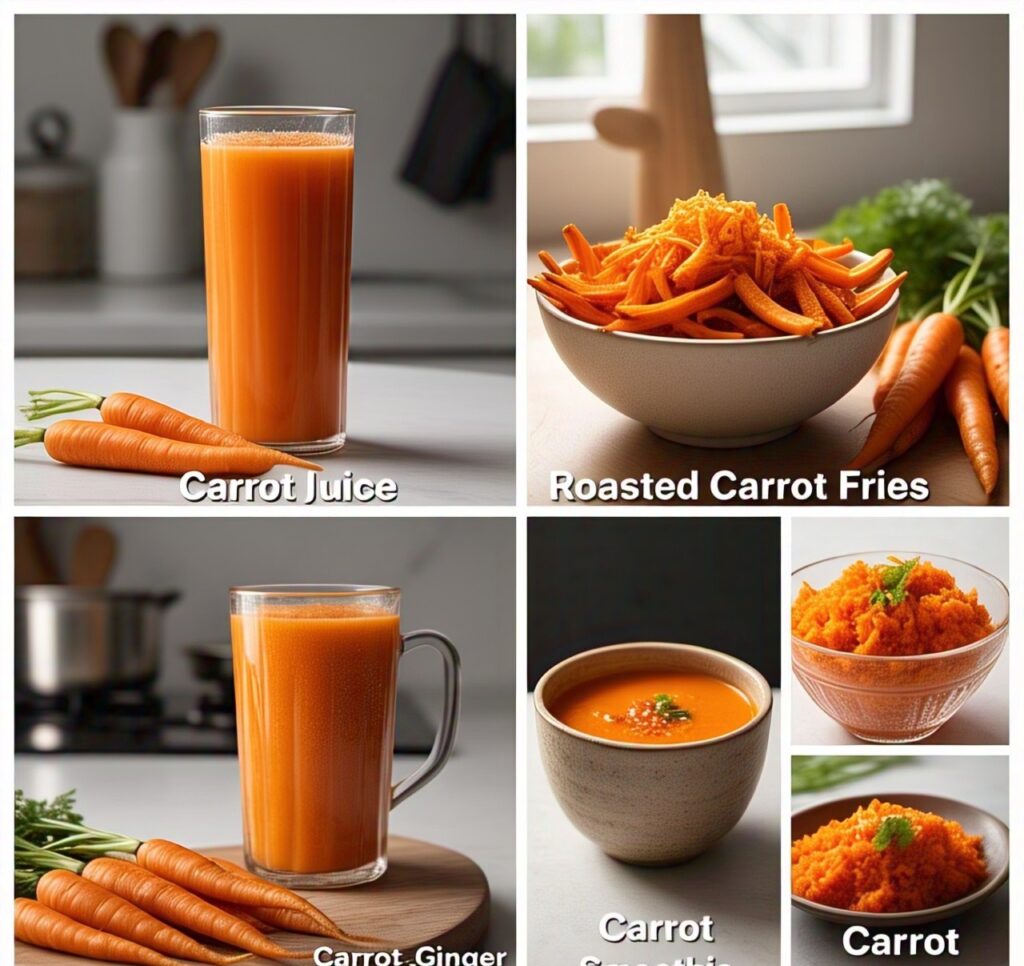When you hear the word carrot, what comes to mind? Bunny food? A crunchy salad topping? A childhood tale about better vision?

What if we told you that this humble root vegetable is actually a powerhouse of nutrition, steeped in ancient history, and incredibly versatile—from detox juices to desserts, and even skincare?
Carrots aren’t just sidekicks—they’re superstars.
Whether you’re on a wellness journey, managing lifestyle diseases, or just curious about healthy eating, carrots might be your best friend in disguise.
A Brief History of Carrots
Before carrots became the vibrant orange root we know today, they were purple, red, white, or yellow—and they weren’t sweet at all.
Carrots are believed to have been first cultivated in Persia (modern-day Iran and Afghanistan) over 5,000 years ago. The modern orange variety emerged in 17th-century Netherlands, selectively bred for sweetness and visual appeal—possibly even as a tribute to the Dutch royal family, the House of Orange.
Today, carrots are grown in over 100 countries and are among the top 10 most economically important vegetable crops worldwide.
What Makes Carrots a Superfood?
Carrots are rich in antioxidants, fiber, vitamins, and minerals, making them an excellent addition to nearly every diet. Here’s what makes them shine:
🥕 Nutritional Profile (Per 100g, Raw)
| Nutrient | Amount |
|---|---|
| Calories | 41 kcal |
| Carbohydrates | 9.6 g |
| Dietary Fiber | 2.8 g |
| Sugars | 4.7 g |
| Vitamin A (Beta-Carotene) | 835 μg (93% DV) |
| Vitamin K | 13.2 μg |
| Vitamin C | 5.9 mg |
| Potassium | 320 mg |
Beta-carotene, the compound responsible for their orange color, converts into vitamin A, which is crucial for eye health, immunity, and skin.
Carrots and Eye Health: Myth or Fact?
You’ve probably heard the phrase: “Eat carrots, they’re good for your eyes.”
This actually stems from WWII propaganda when the British Royal Air Force claimed that pilot accuracy was due to carrots, hiding their use of radar technology.
While carrots won’t give you superhero night vision, they do help maintain good eyesight, especially in low light, thanks to their vitamin A content. Deficiency in this vitamin can lead to night blindness and other vision problems.
Carrot Varieties: Not Just Orange Anymore
Today, carrots come in a rainbow of colors—and each brings unique health benefits:
| Color | Phytonutrients | Benefits |
|---|---|---|
| Orange | Beta-carotene | Eye health, immune support |
| Purple | Anthocyanins | Anti-inflammatory, heart health |
| Red | Lycopene | Prostate health, antioxidant protection |
| Yellow | Lutein | Eye and skin protection |
| White | Fiber-rich | Digestive health, neutral taste |
Try including colorful carrots in your meals for a nutrient boost and plate appeal.
Carrots vs Other Root Vegetables: A Quick Comparison
| Vegetable | Calories (100g) | Key Nutrient | GI Index | Best For |
|---|---|---|---|---|
| Carrot | 41 | Beta-carotene | 35 | Eyes, skin, digestion |
| Beetroot | 43 | Folate, nitrates | 64 | Blood pressure, stamina |
| Potato | 77 | Potassium, starch | 78 | Energy, satiety |
| Sweet Potato | 86 | Vitamin A, fiber | 44 | Gut health, energy |
| Radish | 16 | Vitamin C, fiber | 32 | Detox, liver function |
Carrots strike the perfect balance: low-calorie, high-fiber, low-glycemic, and nutrient-dense.
The Surprising Benefits of Carrots
🧠 1. Brain Health
Studies show that carotenoids may help reduce oxidative stress, improving cognitive function and slowing down age-related mental decline.
💖 2. Heart Protection
Carrots are loaded with potassium and antioxidants, helping regulate blood pressure and reduce cholesterol levels.
🧼 3. Natural Detox
The fiber content in carrots aids digestion and helps remove toxins. Some detox juice cleanses feature carrots as a primary ingredient for this reason.
🧴 4. Skin Glow
Vitamin A supports healthy skin cell turnover. Applying carrot oil topically can improve elasticity and reduce blemishes.
⚖️ 5. Weight Management
Low in calories and high in fiber, carrots increase fullness and reduce overeating—a perfect snack for weight-watchers.
My Personal Carrot Journey: From Raw to Radiant
A few years ago, I started replacing my afternoon snacks with raw carrot sticks and hummus. It was a small change, but the results were surprising:
- I felt fuller, avoiding junk food in the evenings.
- My skin tone evened out, and I received compliments I hadn’t heard in years.
- Digestive bloating reduced noticeably.
Eventually, I added carrot juice every other day, especially post workouts. It gave me a clean burst of energy without the caffeine crash.
How to Add More Carrots to Your Life
Not a fan of raw carrots? No problem. Here are simple, delicious ways to sneak more in:

🍽️ Recipes
- Carrot-Ginger Soup – Anti-inflammatory and comforting
- Carrot Juice – Blend with apple and lemon for a zesty detox
- Carrot Halwa (Indian Dessert) – Cooked with ghee, milk & jaggery
- Roasted Carrot Fries – Crispy, sweet, and savory
- Carrot Smoothie – Mix with banana, cinnamon & almond milk
🧴 Skincare Use
- Mix carrot pulp with honey for a DIY face mask
- Use carrot seed oil as a natural sunscreen booster
- Freeze carrot juice cubes to soothe sunburn
When to Be Cautious
Carrots are generally safe for all, but moderation is key:
- Carotenemia: Eating too many carrots can turn your skin yellow-orange (harmless and reversible).
- Diabetics: Cooked carrots have a slightly higher glycemic index, so balance portions accordingly.
- Allergies: Rare, but some may be allergic to carrot pollen (oral allergy syndrome).
Buying & Storing Tips
- Buy: Choose firm, bright-colored carrots with no cracks. Avoid limp or dull ones.
- Store: Refrigerate in a plastic bag for up to 2-3 weeks. Remove tops to avoid wilting.
- Organic vs Regular: Organic carrots tend to have higher phytonutrient levels and taste sweeter.
Internal Link Suggestion: Check our post on how to store fresh produce longer →
Carrot in Culture & Symbolism
- In Chinese culture, carrots symbolize wealth and good fortune.
- In Western folklore, carrots were once believed to promote romantic desire!
- In Ayurveda, carrots are considered “sattvic”—promoting clarity, calm, and energy.
Final Thoughts: Carrots Are More Than Just Crunch
If you’ve been overlooking carrots as “just another vegetable,” it’s time to reconsider. Whether raw, roasted, juiced, or pureed—carrots offer health, flavor, and versatility in every bite.
They’re affordable, accessible, and adaptable to nearly every cuisine and dietary need.
✅ Your Next Steps
- 🥕 Try one new carrot recipe this week
- 📥 Subscribe to our newsletter for more nutrition hacks
- 💬 Share your carrot story in the comments—raw love or roasted addiction?
👉 Ready to turn crunchy into extraordinary? The carrot revolution starts now.



